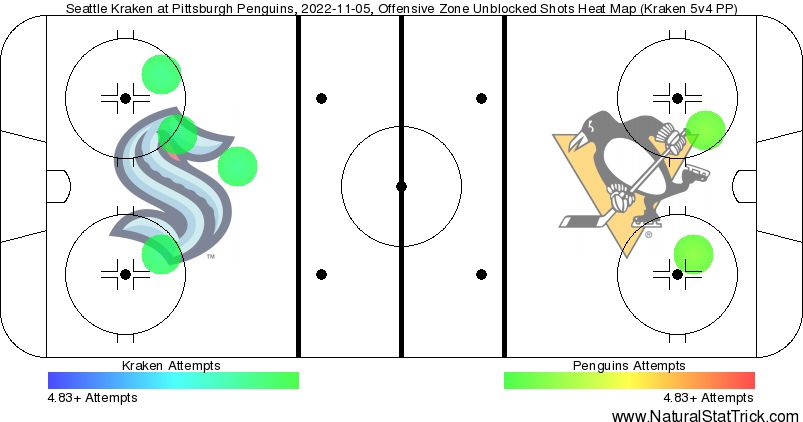When Tristan Jarry was asked Saturday how the team is keeping its confidence amid this losing streak, he said that the team has to "celebrate the little things."
That's something that's becoming harder -- and yet, more crucial -- to do as the skid carries on, with a 3-2 loss to the Kraken at PPG Paints Arena extending the losing streak to seven games.
There just aren't many positives to be found in some of these losses.
If there's one positive that can be taken away from Saturday's loss, it's that the Penguins' penalty-kill -- among the worst in the league entering the game -- showed signs of taking a real step forward in the loss.
The Penguins' penalty-kill ranked 28th in the league with a 71.1% success rate before Saturday's game. They had allowed 11 goals on 38 short-handed attempts, a rate that had them on pace to allow 82 power plays over the course of the season, per historian Bob Grove. For context, the Penguins allowed just 33 all of last season.
Those goals came because the Penguins were allowing a concerning amount of scoring chances. Their rate of 90.83 unblocked shot attempts allowed per 60 minutes of shorthanded ice time was the fifth-worst in the league. They were allowing shots on goal at a rate of 75.32 per 60 minutes, the worst rate of any team's penalty kill.
That poor performance was not for lack of practice, either. Before Saturday the Penguins were averaging 7.6 penalty minutes per game, the sixth-most in the NHL. For a team that is struggling with discipline, to couple that with a poorly-performing penalty-kill is a recipe for disaster.
The Kraken's power play is one of its team's strong suits. Seattle ranked fifth in the NHL on the man advantage entering this game, converting on 12 of their 43 attempts so far this season. Defenseman Vince Dunn and forwards Jaden Schwartz, Matty Beniers, Andre Burakovsky and Jordan Eberle form a formidable top pairing.
The Penguins' defense pairings while short-handed in this one were Brian Dumoulin-Jan Rutta and Jeff Petry-Marcus Pettersson, with Kris Letang working with Petry when Pettersson was the one in the box in the second period. Forward partners were Brock McGinn-Ryan Poehling and Kasperi Kapanen-Bryan Rust.
The Penguins gave the Kraken three power play opportunities in the game -- one in each of the game's three periods. They held Seattle off the scoresheet in all three of those opportunities, and did a pretty good job of making sure Seattle didn't build any momentum with scoring chances or extended offensive zone time throughout.
Seattle only managed a total of three shots on goal over those six total minutes, while the Penguins managed one short-handed shot of their own. The Penguins managed to hold the Kraken to just four unblocked shot attempts in those opportunities, while registering four of their own. The unblocked attempts the Kraken did manage to get off on the power play were mid- to long-range shots -- the Penguins were successful at boxing them out of being able to get shot attempts off from the high-danger areas of the ice.

Kraken coach Dave Hakstol was asked after the game where the "disconnect" came for his team on the power play. In his view, it wasn't that his team had a "disconnect," it was just that the Penguins' penalty-kill was actually just good.
"Well, remember the other team does things pretty well also," Hakstol said. "We had an opportunity in the third that we'd like to execute a little bit better, but they found their pressures."
Rust echoed that sentiment when asked about the Penguins' play short-handed.
"I thought the PK was good," he said. "I thought that we were pressuring, limiting their chances, I thought it was better."
Jarry said that he thought one of the positives was that the team "did a better job of blocking shots" while short-handed. Really, the Penguins only blocked one of the five total attempted shots by the Kraken on the power play, it was just a big one. Beniers had an attempt in the second period that was the closest of any of the five, a wrist shot from the left side of the slot, only feet from the crease. Dumoulin was the one to block it, and followed it up with an immediate clear out of the Penguins' end.
Mike Sullivan said that he thought the Penguins' penalty-kill was "overall much better" in this game.
"I thought they did a real good job tonight," he said. "They had limited zone time. I felt we did a good job making the entries difficult. We were active down the ice."
The Penguins' penalty-kill was especially poor on the first six games of this losing streak -- it had just a 68.4% success rate in those games. For a game like the overtime-loss against Boston (a game in which the Penguins allowed one Bruins power play goal) or some of the other games in which opponents seemed to gain momentum from strong power play showings (whether they scored or not), that could be a difference between a win or a loss.
The Penguins have been in a rough spot to start the season with one of their regular penalty-killers in Teddy Blueger being injured since training camp. He's likely to return in the coming week, an addition that should give the team -- but especially the penalty-kill -- a needed boost, but he alone doesn't turn the tide short-handed.
The Penguins need their penalty-kill to be better than it has been as of late if they want to get back into the win column. Their performance in this one while short-handed was an encouraging step forward.

